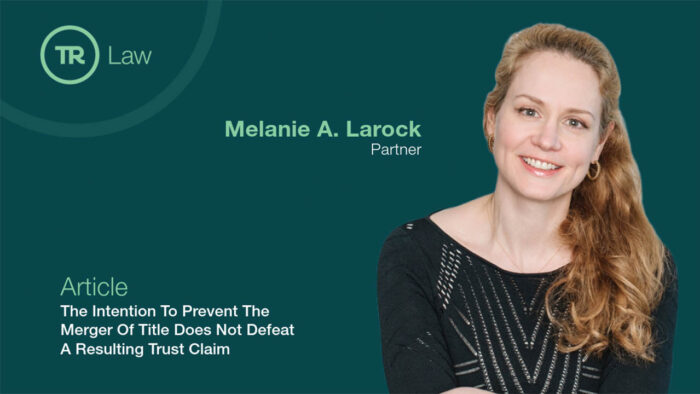Preparing for the Licence Appeal Tribunal (LAT) Hearing: Considerations of the Applicant
Author(s): Wendy Moore Mandel
April 11, 2017

Prior to commencing a LAT hearing, Applicants should consider the following:
Know the Law
The LAT is not bound by any of the precedent established by FSCO. This is especially troubling because it has taken years to interpret some of the language of the SABS and that history has provided some amount of certainty to Applicants and to Insurers about how to interpret the SABS.
Further, very few FSCO Arbitrators (only 2 or 3 at last count) have been appointed to the LAT. This creates further uncertainty – at least in the short term – because disputes will be heard by individuals without experience or training in the complex auto accident benefits regime. Although the LAT is not a new tribunal, it has not historically dealt with insurance matters. The LAT adjudicates matters in a variety of areas including alcohol and gaming regulation, motor vehicle impoundments and driver’s licences, new home warranties, consumer protection, regulation of various occupations and business, etc. Only as of April 1, 2016, has the LAT adjudicated matters in relation to automobile insurance Statutory Accident Benefits Schedule (SABS) disputes.
Despite the fact that the LAT is not bound by FSCO decisions – it is important to know the FSCO decisions that deal with the issue in your case. Although the FSCO decisions are not binding, they have been considered persuasive in LAT decisions to date.
LAT decisions are available from CanLII (The Canadian Legal Information Institute). To date, there are approximately 60 released decisions.
Know the Rules
The Rules of the Tribunal (Licence Appeal Tribunal Rules of Practice and Procedure, Version I (April 1, 2016) are made pursuant to s.25.1 of the Statutory Powers Procedure Act and also pursuant to s.6 of the Licence Appeal Tribunal Act, 1999.
The Rules should be read and understood together with the Statutory Powers Procedure Act and the SABS.
If there is a conflict between the Rules and any statute or regulation, the provisions of the statute or regulation prevail.
Rule 3.1 provides that the Rules are to be liberally interpreted and applied and may be varied or applied to facilitate a fair, open and accessible process and to allow effective participation by all parties and ensure efficient, proportional and timely resolution of the merits of the proceeding. This Rule may prove to be important in circumstances where technical compliance with the Rules is not achieved but is nevertheless appropriate in the circumstances.
Be cognizant of the short timelines
Timelines in the LAT are quite short, once an Application has been submitted. There is a slight strategic advantage to Applicants because they have two years from the date of the benefit denial to make an Application and therefore have time to get themselves organized before the strict timelines of the LAT apply. Insurer/Respondents will have much less time to review the file and determine the strengths and weaknesses of the dispute. Applicants should, therefore, be well prepared before submitting an Application.
There are only 60 days from the date of the case conference to the date of the LAT hearing.
There is mandatory disclosure (Rule 9.2) of the existence of every document and anything else the party intends to present as evidence at the hearing; a list of witnesses the party may call to give evidence and a description of the anticipated testimony; and a copy of all documents, consecutively numbered at least 10 days before the hearing.
If you require a recording of the hearing; a request must be made to the Tribunal at least 14 days in advance of the hearing.
No access to the Court, no real Appeal
The only dispute resolution mechanism available to parties of a SABS dispute is a hearing through the LAT. There is no longer an option to proceed to Court if the dispute does not resolve at the case conference.
Although the right to access our Courts to settle disputes is a fundamental right for all Canadians – this is no longer the case for motor vehicle accident insurance claims.
There is no real right of appeal from a LAT decision, rather there is only a very limited right of reconsideration by the Chair of SLASTO (the Safety, Licensing Appeals and Standards Tribunals Ontario). A hearing decision can only be appealed to the Divisional Court on a question of law. Appeals based on merit are not available.
Hearings are not recorded by the Tribunal. Therefore, if an appeal is something that a party would consider (if required), that party must ask for permission to record the hearing in order to have a transcript available for the Divisional Court.
If your issue in dispute is a question of law – rather than factually based – I would recommend that you request a recording of the hearing in advance so you have a transcript if you need to appeal to the Divisional Court.
The Format of the Hearing
The LAT anticipates that most hearings will be in writing and the decision about the format of the hearing will be made at the case conference.
Justice Cunningham (the original drafter of the dispute resolution system for SABS disputes through the LAT) envisioned hearings to follow three streams: paper reviews, expedited in-person hearings and full in-person hearings. He recommended that criteria be adopted to determine under which stream a case would fall. Unfortunately, the criteria have not been adopted by the LAT (to date) and instead the LAT adjudicator exercises his or her discretion to determine the format of a hearing.
In the limited experience with the LAT to date, Applicants have been frequently told that their evidence and the evidence of their experts must be proffered by affidavit; although the Respondent/Insurer has the right to cross-examine in-person. While the Applicants then have the right to re-examination in–person, re-examination is limited to new issues raised in cross-examination that could not have been dealt with in the original affidavit – a very limited right. This, in my opinion, is prejudicial to the Applicant because it is difficult for an adjudicator to get a “feel” for a witness or the Applicant if the only oral evidence is through cross-examination.
The Applicant should insist on presenting oral evidence if there will be a right to oral cross-examination.
All witnesses must be prepared for cross-examination by the opposing side and briefed about the potential for re-examination.
Expert Reports
There are new standards for Expert reports – the expert must be qualified to provide professional, scientific or technical information and opinion based on special knowledge through education, training or experience; and must provide a signed statement (like Form 53); and must provide a signed report that sets out the instructions provided to the expert in relation to the proceeding and a concise summary of facts and issues that are admitted and that are in dispute.
This is not different from the requirements of experts in the tort system but new to the no-fault system.
No Costs – do you really want the LAT?
Costs at a hearing are only awarded if a party has acted unreasonably, frivolously, vexatiously or in bad faith (Rule 19.1). Essentially – no costs, without cause.
Adjudicator Chris Sewrattan explained in P.B. and RBC Insurance Company, 2017 Can LII 9816 (ON LAT):
Rule 19.1 of the Rules provides that costs may be requested in a proceeding where a party believes that another party in a proceeding has acted unreasonably, frivolously, vexatiously, or in bad faith. This requires an evidentiary record and submissions persuasive on a balance of probabilities.
Rule 19.1 only allows for costs where the impugned party’s conduct occurs in a proceeding before the Tribunal.
Cost awards under Rule 19 are to maintain civility and order during proceedings, to deter conduct that threatens the orderly and civil resolution of an application, and to ensure that the Tribunal’s process and the other participants are respected. They are not to compensate parties for the cost of bringing or defending claims or to punish.
The absence of costs will likely result in fewer counsel appearing at LAT hearings for Applicants. It may also encourage unrepresented litigants to proceed to the LAT in the absence of counsel because there are conversely no cost consequences if they lose.
A hearing on the issue of Catastrophic designation; post-104 Income Replacement Benefits; Attendant Care quantum or other more complex issues can cost $10,000 to $15,000 in report costs alone. It is unfair for a successful Applicant to bear these costs – to secure access to future benefits – under a policy of insurance they already paid for. In the first LAT decision on the issue of Catastrophic Impairment (P.L.F.R. v. Intact Insurance Company, Tribunal File Number: 16-000145/AABS), despite the Applicant’s success in proving a catastrophic impairment after oral evidence from two expert witnesses (a neurologist and a general practitioner with extensive experience in catastrophic impairment designations), no costs were awarded.
As a result, those persons who also have personal injury tort claims, with sufficient limits in that tort case, should avoid using the LAT. Why would the Plaintiff/Applicant incur costs to secure a benefit that was previously denied? Once there is a denial of the benefit, the Plaintiff is not obligated to do anything further and can claim the item in the tort action.
If there are insufficient limits in a tort case, or liability issues in the tort case, an Application to the LAT may be necessary. In those circumstances, counsel for the Applicant (and Plaintiff) should be aware of the case law which provides that a tort feasor should pay costs associated with an Arbitration to secure the payment of accident benefits. (see Ananthamoorthy v. Ellison, 2013 ONSC 4510, at para. 21, Anand v. Belanger, [2010] O.J. No. 4064; 90 C.C.L.I. (4th) 138, at para. 32, Carr v. Modi, 2016 ONSC 1300).
If you have any questions, please contact personal injury lawyer Wendy Moore Mandel at 416-868-3165 or by EMAIL.
Share this








